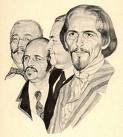Let's face it, we're slowing down on all fronts. We're fighting it and we'll keep fighting it, but there's no doubt about it - it's a struggle.
And I'm not talking about our tennis games, our jogging, our ability to sink those putts. I'm talking brain power - our ability to process information as efficiently and reliably as in the past.
The other day, I finally solved an annoying little problem with our pool pump. Darn thing kept  taking in some air. In previous weeks, I tried lots of stuff - searched for leaks, replaced two rubber O-rings in the system, cursed it, banged it, kicked it. Nothing helped. Then, staring at it in pure hatred, the cause came into focus - the valve that controlled water flow into the pump. Gee, maybe if I readjust that? Sure enough. Problem gone. The simplest, most obvious solution had eluded me for weeks. I am utterly convinced that this would not have happened 30, 20, 10, even five years ago.
taking in some air. In previous weeks, I tried lots of stuff - searched for leaks, replaced two rubber O-rings in the system, cursed it, banged it, kicked it. Nothing helped. Then, staring at it in pure hatred, the cause came into focus - the valve that controlled water flow into the pump. Gee, maybe if I readjust that? Sure enough. Problem gone. The simplest, most obvious solution had eluded me for weeks. I am utterly convinced that this would not have happened 30, 20, 10, even five years ago.
This is familiar to all of us. Some days, we're just sharper than other days, and it has nothing to do with how much sleep we had the night before, how much...see, right there, I momentarily forgot the name of my favorite beer...Corona we might have consumed, or anything else that we readily can point to. Some days, we wake up and the old sharpness is right there; some days, it's not.
Not to worry, it's normal, the experts say, and there is some compensating mental value to getting old moving along in time.
A study (actually a study of previous studies) recently found that the human brain's ability to process information deteriorates with age, but at the same time, our deepening well of experience provides growing benefits.
"Thinking capacity declines with time," said Ellen Peters, a professor of psychology at the University of Oregon and a senior research scientist with Decision Research, a non-profit research group. "We learn less easily. We process information more slowly."
However, from the emotional side of processing, "we may show improvements over time, she said. "We may tend to feel our way through decisions more when we are older."
Her work mostly involves the truly elderly, but much of it applies to Baby Boomers.
Take this insight and conclusion, for instance:
As we grow older (and time grows shorter), our motivation begins to change from doing what might be best for us in the future to doing what might feel best to us right now. (Yeah, I know, Boomers and self-indulgence and living for the moment and blah blah blah, but we're being serious here).
For instance, Another recently published study found that, when it comes to making choices about health and medical treatment, older people focus more on positive and fairly immediate benefits and less on the long-term negative risks.
So, for instance, though your doctor might tell you to try that Prilosec OTC for 14 days and then lay off it for awhile, if the acid reflux returns after just a day or two without it...boom...there you go, unsealing that annoying foil wrapper and popping one of those wonderfully effective pink pills. The heck with the future; I need this now.
Probably nothing wrong with that, but it could be helpful as we get older to keep in mind that...our minds keep changing.
 "Say you want to retire at 62 and would draw a Social Security benefit of $1,125 a month. That's 25 percent less than the $1,500 you would collect if you waited until age 66.
"Say you want to retire at 62 and would draw a Social Security benefit of $1,125 a month. That's 25 percent less than the $1,500 you would collect if you waited until age 66.





































